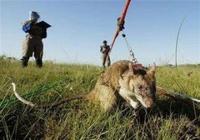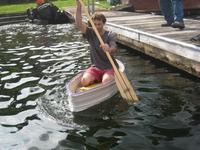-
“Student-centered” approach to science education more effective
A group of educational researchers are drawing widespread attention after their paper measuring the superior results of a more “student-centered” approach to teaching science was published in the journal Science; the researchers say that the stakes are extraordinarily high, so it is critical that the United States find more effective ways of teaching the so-called STEM fields (science, technology, engineering, mathematics) in K-12 classrooms
-
-
Center for Security Studies receives $3 million grant
Officials at the Texas Tech University System and Angelo State University (ASU) announced that the U.S. Air Force will provide a $3 million grant to ASU which will be used to continue and expand the school’s Center for Security Studies (CSS)
-
-
New issues of the Journal of Homeland Security Education is available online
The latest issue of the Journal of Homeland Security Education is out; it contains a number of articles relevant to the teaching of homeland security practices, which is now one of the top ten majors for undergraduates in the United States
-
-
Security education is becoming a central part of security hiring, promotion
There is a growing emphasis on homeland security-related education in security hiring in both the private and government sectors; this growing demand has lead to a rapid growth in college and university degree programs in homeland security – the number of such programs is now estimated to be 350; trouble is, those programs do not have a commonly agreed upon curriculum, and as a result, the classes chosen to be part of an individual’s curriculum are based on the available faculty, rather than proven value to the students
-
-
Raytheon opens STEM teacher award program
Raytheon has opened the 2012 application process for its Raytheon-Engineering is Elementary (EiE) Teacher Scholarship Program; during the 2012-13 school year, Raytheon will grant awards of $3,000 each for selected elementary school teachers nation-wide whose applications best demonstrate innovative methods of generating student enthusiasm about engineering concepts
-
-
NSF awards Norwich University a grant for computer security scholarships
Norwich University in Vermont was awarded a $975,000 grant from the National Science Foundation’s (NSF) Scholarship for Service program; the funds will be used to support Information Assurance students; the students will fulfill the “service” obligation through employment by a government agency in their area of information assurance expertise for two years
-
-
U.S. risks losing out to Asia in medical research
Medical research saves lives, suffering, and dollars — while also creating jobs and economic activity; the United States has long led the world, with hundreds of thousands of jobs and marketable discoveries generated by government research funding every year; this is now changing: strong, sustained growth in research spending in Asian nations contrasts with U.S. cuts and short-term approach, and a brain drain could result
-
-
U.S. Army trains rats in explosives detection

Landmines kill between 15,000 and 20,000 people a year, and continue to kill adults and children decades after a conflict ends; the U.S. Department of Defense currently relies on dogs as the animal of choice for explosives detection, but Pentagon researchers want to see whether rats can be trained to do the job; rats are smaller so they can search smaller spaces than a dog can, and are easier to transport
-
-
Penn Stater is first in family to earn masters degree

Isiah Jones of Harrisburg will receive a master’s degree in Homeland Security-Information Security and Forensics, which he earned online through Penn State’s World Campus; the Penn State World Campus specializes in adult online education, delivering more than eighty of Penn State’s most highly regarded graduate, undergraduate, and professional education programs through online formats
-
-
New STEM education initiative in Virginia
A 2010 Georgetown University study found that by 2018, Virginia will need to fill more than 400,000 science, technology, engineering, and applied mathematics (STEAM)-related jobs, while the country will confront a shortage of three million STEAM-educated college graduates; Virginia Tech and the Virginia STEAM Academy are forming a strategic partnership to address critical STEAM education needs in the Commonwealth of Virginia
-
-
Conflict of interests charges surround two pro-fracking studies

Two recent studies — by research institutes at the University of Buffalo and the University of Texas — on the relationship between fracking and the contamination of groundwater, offered what was claimed to be scientific, peer-reviewed research which concluded that fracking does not contribute to such contamination; an examination of the two reports reveals that they were not properly reviewed according to accepted academic standards, and that their authors, and the research institutes which sponsored them, are heavily involved with companies which conduct fracking operations; the author of the University of Texas report sits on the board of a leading fracking company, where his compensation is more than twice as large as his UT salary; he did not disclose this fact in the study — or inform UT of this connection; UT is investigating
-
-
Winners of the California Cyber Summer Camp Capture the Flag competition announced
Cal Poly Pomona, in partnership with Booz Allen Hamilton and the U.S. Cyber Challenge, hosted the U.S. Cyber Challenge California Cyber Summer Camp in Pomona, California; the camp curriculum included in-depth workshops on a range of topics, including penetration testing, reverse engineering, and forensics; the week was capped off by a virtual “capture the flag” competition and awards ceremony on the last day
-
-
Game lets players try their hand at computer security
A new game — Control-Alt-Hack — gives teenage and young-adult players a taste of what it means to be a computer-security professional defending against an ever-expanding range of digital threats; the game’s creators will present it this week in Las Vegas at Black Hat 2012; educators in the continental United States can apply to get a free copy of the game while supplies last; it is scheduled to go on sale in the fall for a retail price of about $30
-
-
Engineering students race first 3-D printed boat in Milk Carton Derby

University of Washington mechanical engineering students braved uncharted waters as they paddled to the finish line at the annual Milk Carton Derby at Green Lake in Seattle in what they believe is the world’s first boat made using a 3-D printer
-
-
World’s top high-school chemistry students to compete in the International Chemistry Olympiad
On 20 July, nearly 300 high school students from more than seventy countries will arrive in the Washington, D.C., area to compete in the 44th International Chemistry Olympiad (IChO) at the University of Maryland, College Park
-
- All
- Regional
- Water
- Biometrics
- Borders/Immig
- Business
- Cybersecurity
- Detection
- Disasters
- Government
- Infrastructure
- International
- Public health
- Public Safety
- Communication interoperabillity
- Emergency services
- Emergency medical services
- Fire
- First response
- IEDs
- Law Enforcement
- Law Enforcement Technology
- Military technology
- Nonlethal weapons
- Nuclear weapons
- Personal protection equipment
- Police
- Notification /alert systems
- Situational awareness
- Weapons systems
- Sci-Tech
- Sector Reports
- Surveillance
- Transportation
Advertising & Marketing: advertise@newswirepubs.com
Editorial: editor@newswirepubs.com
General: info@newswirepubs.com
2010-2011 © News Wire Publications, LLC News Wire Publications, LLC
220 Old Country Road | Suite 200 | Mineola | New York | 11501
Permissions and Policies
Editorial: editor@newswirepubs.com
General: info@newswirepubs.com
2010-2011 © News Wire Publications, LLC News Wire Publications, LLC
220 Old Country Road | Suite 200 | Mineola | New York | 11501
Permissions and Policies
